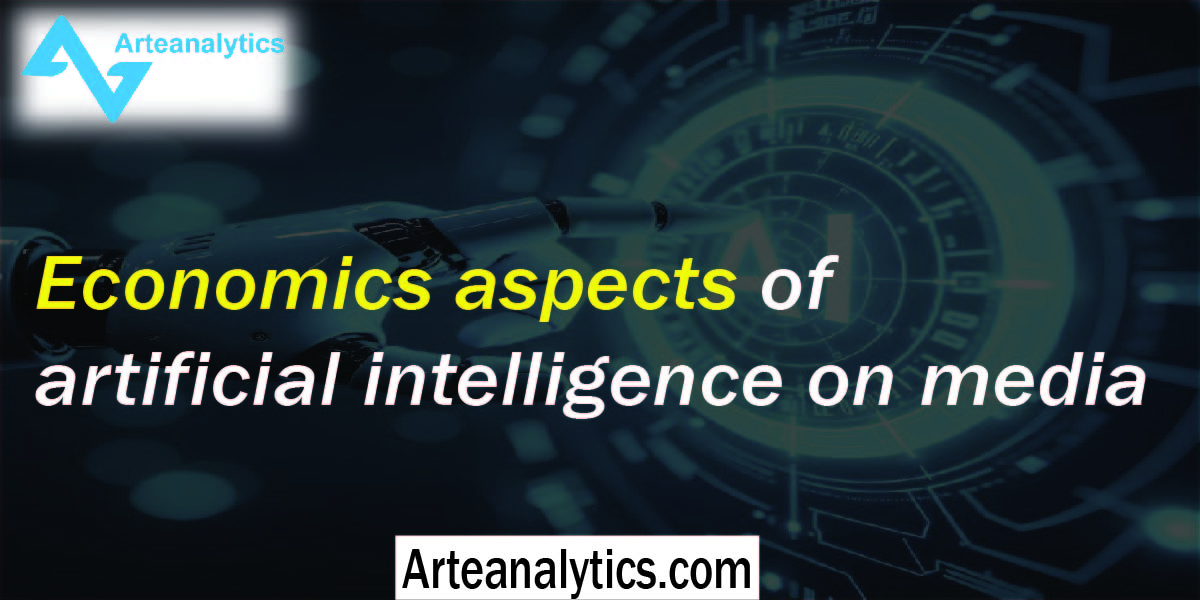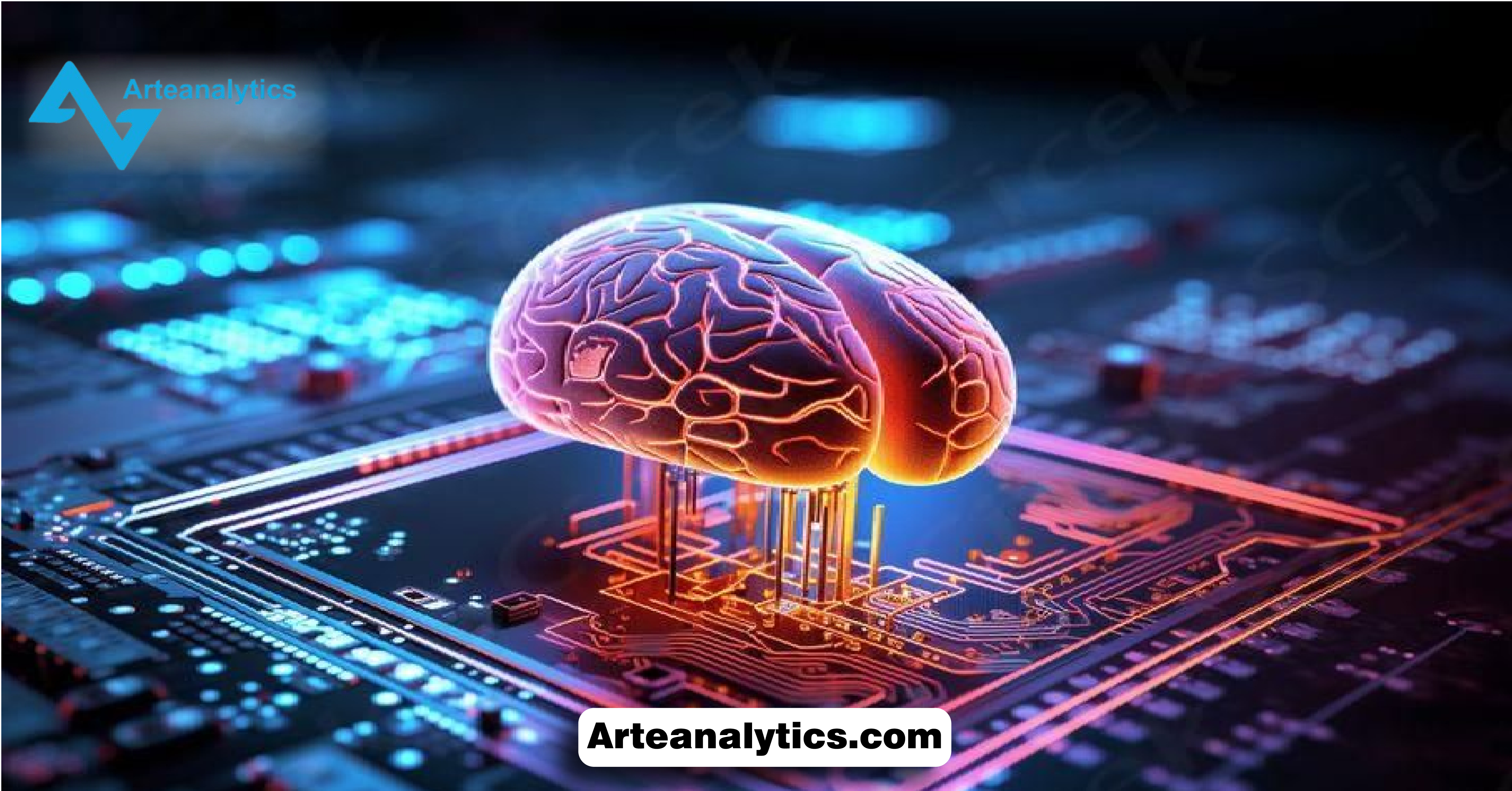Economics Aspects of Artificial Intelligence on Media
Blog | Published on: 2025-06-19

Introduction
Artificial Intelligence (AI) continues to revolutionize media companies at an incredible rate. Media firms now utilize AI tools for production, distribution and personalization purposes ultimately cutting costs while improving efficiency. AI technology also enhances audience targeting by studying consumer behavior in real time, which enables media outlets to provide more engaging and pertinent content while advertisers experience increased ROI. AI-powered algorithms can curate news and entertainment that responds instantly to user preferences, while traditional journalism continues its evolution by employing automated reporting and data driven insight gaining ground.
Journalists also use AI to verify facts and moderate content, even as challenges such as misinformation or job displacement arise. Still, its potential is substantial, AI serves as a key catalyst of innovation and competition within the media sector; over time its economic repercussions will increase as adoption spreads across platforms.
The Economic Aspects of Artificial Intelligence
Artificial Intelligence (AI) has transformed many areas of global economics and society, not least journalism. From creating content to reaching target audiences and revenue generation, AI has profoundly altered how media organizations function and generate money. As technology improves, AI continues to introduce new economic realities while simultaneously changing roles within media industries as monetization strategies evolve and competitive advantage increases. This article investigates AI's effects across the media ecosystem while outlining its advantages, drawbacks, and future in journalism, entertainment and online advertising.
The Transformation of Content Creation
AI has transformed the process of content production within the media industry. While previously producing content required substantial investments in human resources such as journalists, video editors or graphic designers today, AI-powered tools make it much simpler and cheaper to automate many of these tasks, significantly lowering production costs.
News agencies such as Associated Press and Reuters often utilize natural language generation (NLG) algorithms to write financial reports as well as sports recaps quickly and understandably, reducing labor costs while simultaneously increasing output.
AI also enables the automatic production of video content through platforms such as Lumen5 and Pictory that transform text to video using appropriate images and voiceovers ultimately making diversification of content simpler and less costly than ever, while automation empowers smaller media companies to compete against bigger corporations.
However, this change raises serious concern regarding its impact on professional creatives' finances. While AI may improve productivity, its use can reduce job demand resulting in unsecure employment conditions for editors, writers, and designers.
Enhancing Audience Targeting and Personalization
Artificial Intelligence in media provides another major economic benefit by targeting audiences. Algorithms analyze vast datasets consisting of user preferences, behaviors and demographics in order to provide highly tailored content. Netflix and Spotify rely heavily on machine learning powered recommendation engines as engagement boosters which reduce user churn rates while simultaneously increasing revenue from subscriptions.
Digital news websites use AI-powered personalization of articles and headlines based on individual user profiles. By offering newsfeeds tailored specifically for each reader, publishers can increase reader retention as well as the duration spent browsing sites, two key indicators of successful ad monetization.
Personalization can increase conversion rates and advertising efficiency. Advertising companies have recognized this benefit and are willing to pay more for ads targeting specific audiences; as a result, media companies have adopted an entirely new revenue model based on data driven marketing, which maximizes revenues per user.
AI in Advertising and Monetization
AI technology has revolutionised digital advertising and transformed media companies' revenue models. Programmatic marketing uses artificial intelligence (AI) to acquire and sell inventory ads real time; replacing traditional methods for placing them. This technology enables publishers to maximize the value of advertising space while providing advertisers with more accurate targeted ads.
Google and Meta (formerly Facebook) use AI-driven dynamic auctions for advertising that serve advertisements tailored to current behavior, ultimately benefiting media companies hosting these platforms with increased ad revenues without needing to manage this process themselves.
Artificial Intelligence can also improve ad performance tracking. By analysing click-through rates, dwell times, and user experiences, AI algorithms can recommend improvements that increase effectiveness of ads. This data allows publishers to demonstrate to advertisers the value of their work while building long-term relationships and income streams that recur over time.
However, the concentration of power in advertising with tech giants creates problems for media companies with smaller media brands that struggle to compete for advertising with these big players. As a result, more media companies have turned to subscription models or paywalls in order to remain economically sustainable.
Labor Market Shifts and Economic Displacement
AI's influence in the media has created significant disruption in the employment market. Automating repetitive tasks may reduce entry-level or mid-level jobs in editorial and production; leading to greater productivity while disrupting traditional models of employment.
AI creates new job opportunities in areas such as machine learning, data science or algorithm auditing. Media companies have begun hiring specialists to design, create, maintain and audit AI systems responsibly; analyze data driven insights; ensure algorithms are being utilized responsibly and audit algorithms accordingly roles which typically pay higher wages due to increased technologically skilled workforce participation.
Media professionals face many changes with great difficulty and upskilling and training remain essential components of economic development. Businesses that invest in developing their workforce will better be equipped to navigate this shift and keep key institutional knowledge intact.
Impact on Media Consumption Habits
AI has altered how people consume media and thus altered the economic model. Intelligent suggestion systems and assistants with voice activation as well as content fragments designed for mobile usage have altered people's consumption habits significantly, forcing media companies to implement innovative distribution and production strategies to satisfy consumer expectations for instantaneous access to tailored content tailored directly to them.
Economy wise, this shift requires moving away from mass content and towards highly targeted, high value offers. Micropayments, subscription services and the freemium model have emerged as potential revenue streams; AI helps in deciding which content can be made freely available while which should remain behind paywalls to maximize both engagement and monetization potential.
But this individualized content often creates filter bubbles, restricting users from seeing different viewpoints. Economically speaking, this could reduce journalism's value as a service and prompt calls for greater transparency of algorithms as well as education on media literacy.
Startups and Innovation Ecosystems
AI has reduced entry barriers for startups entering media, opening up doors of creativity for young media creators. Startups today use AI to develop special content platforms, automated podcast production tools and synthetic anchors for news broadcasts, which is challenging traditional media giants with innovative formats and cost cutting content creation models that compete on quality.
Economically, this has expanded the media industry and created prices that are competitive, providing consumers with more options while investors discover new avenues using AI-driven media technology. Venture capital funding continues to flow into AI media startups in areas like voice synthesising, generative art creation and automated journalism production.
Parallel to this trend, AI media innovation incubators and accelerators have also proliferated globally across tech hubs. These environments foster collaboration between journalists, technologists, business experts, and journalists that leads to faster go-to-market timelines as well as sustainable monetization models.
Ethical and Regulatory Implications
Economic impacts of AI on media cannot be fully understood without taking into account both ethical and legal considerations. Deepfakes, false information and algorithmic biases threaten trust between journalists and their publics, an invaluable asset in journalism as an economic field.
AI-generated content can often be difficult to distinguish from material created by humans, which raises concerns over authenticity and trustworthiness. Economically speaking, this could result in reduced engagement from audiences as well as decreased ad revenue as well as higher verification costs related to compliance regulations and laws.
Regulation and government bodies have begun addressing these issues. Their proposed AI transparency regulations for data use and copyright could significantly impact operations costs and strategic decisions for media firms. Although compliance could require an initial investment, transparent AI practices could enhance brand reputation while building customer loyalty resulting in long-term economic benefits.
Global Impact and Localization
AI has enabled publishers to expand their reach globally while tailoring content specifically to local viewers. Automated tools for localization and translation allow them to reach diverse markets linguistically and culturally without needing large regional teams; creating new revenue streams across Asia, Africa and Latin America.
Netflix and Disney, two global media giants, utilize AI technology to gauge viewer tastes locally before producing programming that appeals to international viewers. Not only does this increase subscriptions but it also benefits local economies by investing in local talents and facilities for production.
However, the presence of U.S based AI infrastructure providers raises serious questions regarding digital sovereignty and culture homogenization in our country. States with strong media traditions might respond by investing in local AI technology or by setting content restrictions locally.
The Future Outlook
AI will have an even larger effect on media in the near future, as more technologies like generative AI (e.g. ChatGPT and Sora), real time video synthesis and chatbots with emotional intelligence become available to change how stories are told and facilitate interactions among individuals.
Media companies that adopt AI proactively may experience an increase in profitability, market share and audience trust - provided their implementation meets ethical considerations while continually investing in human capital, and meeting changing cultural and regulatory expectations.
Furthermore, human innovation and machine productivity will determine the future economics of media. Instead of replacing creators and journalists, AI may augment their capabilities for greater ambitions and greater understanding.
Conclusion
Artificial Intelligence has opened the door to unprecedented economic expansion for this industry. From automating production, increasing personalization, and opening new streams for monetisation, AI has made media businesses run more effectively and profitably while simultaneously creating major labor shifts with accompanying ethical concerns and competitive difficulties.
As AI increasingly dominates our landscape, navigating it requires taking an approach that strikes a delicate balance between AI's strengths and investing in human potential as well as upholding ethical standards and an inclusive outlook. With storytelling becoming ever more dependent on technological innovations like artificial intelligence (AI), its success depends on adapting, evolving and fulfilling its mission in this new AI-dominated environment.
Frequently Asked Questions
Question 1: What is the impact of artificial intelligence on the economy?
AI will ultimately spur economic growth while creating jobs and providing employees with opportunities to hone their skills. In order to keep pace with AI advances, approximately 50 percent of the world workforce must upgrade or retrain by 2025 to remain relevant and prepared for its arrival into workplace environments.
Question 2: How is AI used in economics?
Due to their vast amounts of data, AI systems are well equipped to offer insight into trends in economic variables like inflation rates and employment numbers providing policymakers with information necessary for devising effective plans to stabilize economies while driving sustainable growth while decreasing inequality.
Question 3: What is the economic impact of AI in 2030?
AI could add as much as $15.7 trillion1 to the global economy by 2030 - more than China and India combined! Of this figure, approximately $6.6 trillion could come from improved productivity while another $9.1 trillion may result from consumption-related effects.
Question 4: What is the role of AI in the digital economy?
Artificial Intelligence (AI) is an ever-evolving technology with the power to change how we do business. AI has proven effective at increasing efficiency, productivity, customer engagement as well as developing new products and services.
Question 5: Why is artificial intelligence important to economic growth?
Artificial intelligence has three ways of contributing to economic growth. First, AI can automate complex physically demanding tasks; furthermore, artificial intelligence could bolster existing assets and labor; as well as increase capabilities of workers and increase capital efficiency.


